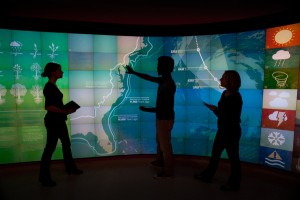 Science, Technology & Society (STS) is an interdisciplinary field of study that seeks to explore and understand the many ways that modern science and technology shape modern culture, values, and institutions, and how modern values shape science and technology. STS examines how science and technology emerge, how they enter society, how they change through social processes, and how society changes in response to science and technology. Many examples illustrate these relationships:
Science, Technology & Society (STS) is an interdisciplinary field of study that seeks to explore and understand the many ways that modern science and technology shape modern culture, values, and institutions, and how modern values shape science and technology. STS examines how science and technology emerge, how they enter society, how they change through social processes, and how society changes in response to science and technology. Many examples illustrate these relationships:
- Biotechnologies: Genetic science and engineering opens up the possibility of humans taking control of life, itself. By altering the genetic makeup of plants, animals and eventually humans, we may change forever our relationship to nature.
- Globalization & Economic Competitiveness: The growing scale of economic competition portends a “global culture”, tied together by computers, satellites, and the internet. What effects are these developments already having on workers, consumers, and nations? What will the future hold?
- The Internet: The emergence and spread of computer-mediated communications is one of the fastest growing revolutionary technologies in history. The Internet will likely change how we understand community, personal identity, and the transfer of information around the world.
- Weapons Technologies, Terrorism, and Security: The arms race continues, even after the fall of the Soviet Union. Nuclear weapons, missile delivery systems, chemical and biological weapons, as well as ever-more-destructive conventional weapons present unique and compelling problems for all humanity.
These, and many other new sciences and technologies, are among the most powerful forces operating in the world today. It is critical that those of us who create, use, consume, and live with the products of modern science and technology understand these forces; this is the intellectual goal of science, technology, and society. Note: Students should plan to declare the STS major at least one year before planning to graduate. Courses include: Contemporary Science, Technology, and Human Values, Technology in History, Biomedical Ethics, Philosophical Issues in Environmental Ethics, Genetics in Human Affairs, Technological Catastrophes, and World Populations & Food Prospects Sample STS Specialty titles include: Biomedical, Engineering Ethics, Engineering & Technology, Environmental Ethics, Nutrition Science, Philosophy of Science, Science, Technology & International Affairs, Technology in Society
| College | |
| Discipline |
|
| Academic Department | |
| Departmental Contact | |
| Major Overview | |
| Plan Requirements | |
| Semester Sequence | |
| Minors | |
| Skills You Could Develop |
|
| Learn More About This Major | |
| Career Titles | |
| Learn More About Careers |